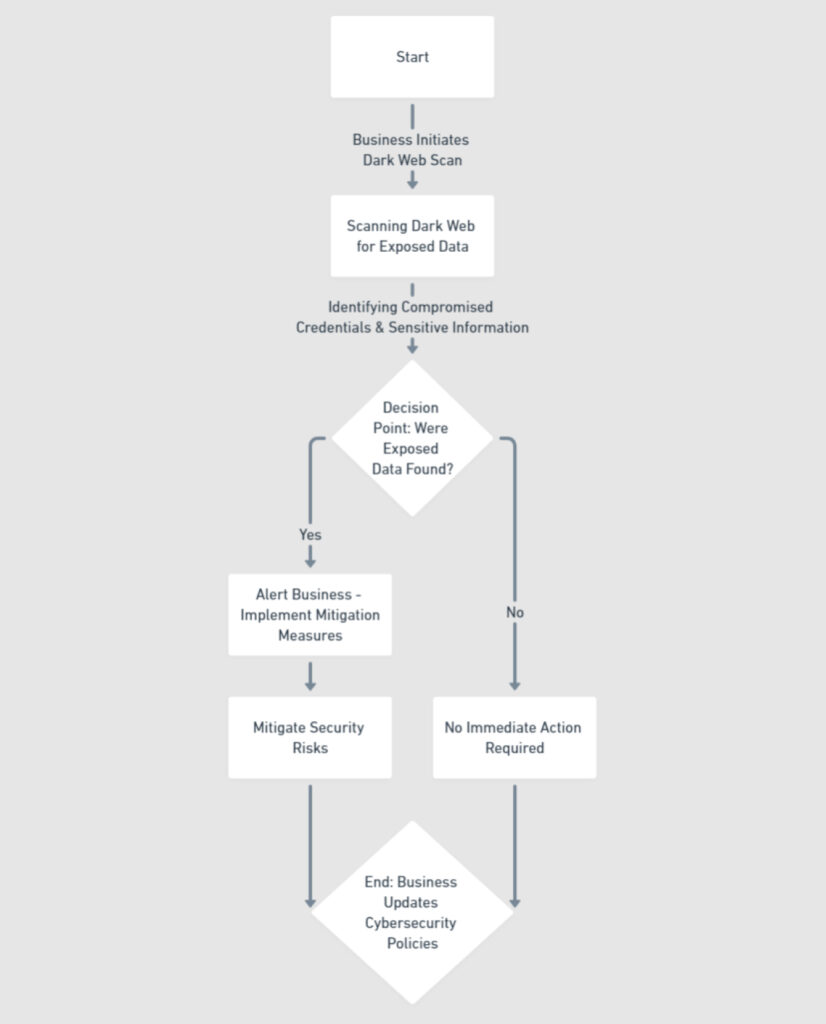
Understanding Dark Web Threats in the UAE
The dark web, a concealed part of the internet accessible only through specific software, has become a hub for cybercriminal activities. Unlike the surface web, which is publicly accessible, and the deep web, consisting of password-protected sites, the dark web operates in anonymity, providing a platform for the trade of stolen data, illicit goods, and malicious software.
For businesses in the UAE, the rise of cyber threats on the dark web presents a significant challenge. A recent study revealed that the cost of cybercrime in the Middle East is expected to exceed $2 billion annually by 2025, with the UAE being a prime target due to its rapidly digitizing economy. Cybercriminals frequently exploit exposed business information—such as employee credentials, financial records, and intellectual property found on the dark web to orchestrate data breaches and ransomware attacks.
Given the increasing reliance on digital infrastructure, especially among small and medium-sized enterprises (SMEs), conducting a thorough cybersecurity assessment, including a dark web scan, is essential. Many UAE businesses may not realize that their information is being actively traded or targeted on the dark web, putting them at high risk. A proactive cybersecurity strategy, tailored for small businesses, can help mitigate these risks and safeguard against costly breaches.
This article explores the specific threats businesses in the UAE face from the dark web and why a comprehensive dark web scan is critical for maintaining robust cybersecurity defenses.
Why the UAE is a Growing Target for Dark Web Activities

The UAE’s increasing prominence as a financial and technological hub has made it a prime target for dark web-related cyber threats. Several factors contribute to this heightened risk, including rapid digital transformation, significant economic wealth, and its strategic geopolitical position. Businesses in the UAE, particularly those in critical sectors like finance, energy, and IT, are vulnerable to data breaches and cyberattacks originating from dark web activities.
A major factor driving this trend is the country’s rapid adoption of digital technologies, which has led to an expansion in attack surfaces for cybercriminals. UAE organizations deter around 50,000 cyberattacks daily, with many of these targeting business-critical information, such as customer data and employee credentials. The financial impact is significant—data breaches in the Middle East, including the UAE, are among the most expensive globally, averaging $8 million per incident in 2023.
Moreover, the UAE’s geopolitical significance as a leader in global finance and energy places it in the crosshairs of both cybercriminal groups and state-sponsored actors. The dark web is often used as a platform to trade stolen data, plan attacks, and recruit insiders, making it crucial for businesses to perform comprehensive cybersecurity risk assessments that include dark web scans. These assessments can help identify vulnerabilities before they are exploited, providing a clear understanding of potential risks.ation, such as customer data and employee credentials. The financial impact is significant—data breaches in the Middle East, including the UAE, are among the most expensive globally, averaging $8 million per incident in 2023.
Dark Web Threats: What to Look Out for in Your Business

Businesses in the UAE, particularly small and medium-sized enterprises (SMEs), face a wide range of cyber threats that originate from the dark web. These threats often involve stolen credentials, malware distribution, and data breaches, posing significant risks to business operations and sensitive information. Understanding these threats is essential for any business looking to implement effective cybersecurity strategies.
One of the most common top cybersecurity threats for small businesses is the sale of stolen credentials on the dark web. Cybercriminals often acquire these credentials through phishing attacks or malware and then sell them to other malicious actors. In 2023, a major breach in the UAE’s financial sector resulted in thousands of compromised customer accounts being sold on dark web forums.
Businesses unaware of these breaches may face severe consequences, including financial loss and reputational damage.
Another prominent threat is ransomware, where attackers encrypt company data and demand payment for its release. Ransomware has increasingly targeted UAE businesses due to their reliance on digital infrastructure. In some cases, critical industries, such as healthcare and energy, have been affected, causing operational disruptions and financial damages .Regular cybersecurity risk assessments and the implementation of backup systems can mitigate these risks.
Malware distribution is also a frequent concern, often spread through phishing emails or unpatched software vulnerabilities. Once installed, malware can siphon sensitive data, track employee activity, or even disable key business functions. These threats are particularly harmful to businesses that do not invest in comprehensive cybersecurity solutions. Implementing a security gap analysis can help identify these weaknesses early and prevent data breaches in small businesses.
| Threat Type | Example | Impact |
|---|---|---|
| Stolen Credentials | Phishing attacks leading to stolen logins | Unauthorized access to systems, data theft |
| Ransomware | Attacks on UAE healthcare and finance sectors | Operational disruption, financial loss |
| Malware Distribution | Malicious software spread via email | Data theft, system disablement |
| Phishing | Emails posing as trusted entities | Credential theft, unauthorized financial transfers |
By conducting regular cybersecurity assessments, implementing preventive measures, and staying vigilant about dark web activity, UAE businesses can significantly reduce the likelihood of becoming victims of these attacks.
Why UAE Businesses Need a Dark Web Scan

A comprehensive dark web scan is an essential component of modern cybersecurity strategies, particularly for businesses in the UAE, which are increasingly vulnerable to cyber threats. Such a scan helps identify exposed information, such as stolen credentials, intellectual property, or sensitive business data, often traded on the dark web. For businesses operating in industries like finance, healthcare, and IT, where sensitive information is highly valuable, a dark web scan is a proactive measure to prevent breaches and unauthorized access.
A dark web scan is part of a broader security gap analysis, allowing businesses to detect weaknesses in their cybersecurity posture. During a scan, specialized tools search for company data, employee credentials, and other sensitive information that may have been compromised and listed on dark web marketplaces. By identifying these threats early, businesses can take immediate corrective actions, such as resetting passwords, updating security policies, or implementing stronger authentication methods. This reduces the risk of further exploitation and prevents data breaches, which are often costly and damaging to a company’s reputation
The gap analysis in cybersecurity highlights potential vulnerabilities that may not be immediately visible through traditional security assessments. For example, businesses may be unaware that former employees’ credentials are still active and available on the dark web, creating a backdoor for cybercriminals to access internal systems. A security gap assessment pinpoints such issues, helping businesses close gaps before they are exploited.
In addition to preventing data breaches, a dark web scan also supports regulatory compliance. Many businesses in the UAE are required to comply with strict data protection regulations, especially in industries like finance and healthcare. A regular dark web scan helps companies comply with cybersecurity regulations by demonstrating proactive measures in identifying and mitigating risks related to data exposure.

Best Cybersecurity Solutions for Small UAE Businesses
Selecting the right cybersecurity solutions for small businesses in the UAE requires a strategic approach, particularly as these businesses often face constraints in resources and expertise. The first step is conducting a thorough cybersecurity risk assessment to identify vulnerabilities and prioritize areas for improvement. Understanding the specific risks your business faces, such as data breaches or ransomware, helps you choose the best tools and services tailored to your needs.
For small businesses with limited budgets, exploring free cybersecurity resources for small businesses can provide valuable guidance. Many organizations offer free tools such as vulnerability scanners, antivirus software, and password management systems. However, relying solely on free resources may not provide comprehensive protection, especially against sophisticated threats.
When selecting cybersecurity solutions, it’s essential to focus on those that offer a balance between cost-effectiveness and robust protection. For example, Unified Threat Management (UTM) systems provide a holistic solution by bundling multiple security features, such as firewalls, intrusion detection, and antivirus, into a single platform. Additionally, a security gap analysis can help identify missing security measures and guide businesses in choosing solutions that fill these gaps, whether through external cybersecurity services or in-house improvements.
Ultimately, businesses should look for solutions that provide scalability and are easy to integrate into existing systems, ensuring ongoing protection as the company grows.
While traditional security solutions offer a baseline level of protection, they may not be sufficient to combat the sophisticated threats posed by the dark web. For a deeper exploration of how cloud computing and Artificial Intelligence (AI) are revolutionizing cybersecurity, empowering businesses to achieve a more comprehensive and proactive defense, explore our article: Leveraging Cloud and AI Solutions for Comprehensive Cybersecurity Coverage. This article delves into the potential of these cutting-edge technologies to strengthen your organization’s security posture and safeguard your valuable assets in the digital age.
Protecting your business from dark web threats is not just an option it’s essential for safeguarding your company’s sensitive data and preventing costly breaches. Every day, cybercriminals actively seek out exposed credentials and confidential information to exploit for financial gain. Early detection through a comprehensive dark web scan can be the difference between a minor issue and a major breach that disrupts your operations.
At CyberNod, we offer an advanced dark web scanning service designed to help your business stay ahead of these threats. Our tools search deep within the dark web for any signs of compromised data related to your company, allowing you to act before attackers do. The sooner you identify these risks, the faster you can implement security measures to mitigate potential damage.
Don’t wait until it’s too late visit CyberNod today to protect your business from dark web threats and prevent costly data breaches. Take proactive steps to secure your operations and ensure peace of mind with our trusted cybersecurity services.
Why UAE Businesses Must Address Dark Web Threats
The growing cyber risks associated with the dark web are a critical concern for businesses in the UAE. Whether it’s stolen credentials, malware, or data breaches, companies must take proactive measures to protect their sensitive information. Small businesses, in particular, are increasingly vulnerable, often lacking the resources to address these threats comprehensively.
By conducting regular cybersecurity assessments and utilizing services like dark web scans, businesses can detect vulnerabilities early and prevent data breaches that could disrupt operations and tarnish their reputation. Implementing a robust cybersecurity plan is essential to safeguarding your business from the dark web. Investing in prevention today ensures long-term protection for your company’s most valuable assets.
Categorized in:
Comments